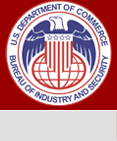Where Industry and Security Intersect
What's New | Sitemap | Search


Frequently
Asked Questions & Answers
Implementation of the Syria Accountability Act: Background
BIS License Requirements
BIS Licensing Policy
Syrian Accountability
and Lebanese Sovereignty Restoration Act
Syrian General Order No. 2
On December 12, 2003, the President signed the Syria Accountability and Lebanese Sovereignty Restoration Act (SAA) (Public Law 108-175). Congress passed the SAA to sanction Syria for its support for terrorism, its occupation of Lebanon, weapons of mass destruction programs, illegal imports of Iraqi oil, and its role in the ongoing security problems in the Middle East.
Section 5(a)(1) of the SAA requires a prohibition on the export to Syria of all items on the Commerce Control List (CCL). The SAA also requires the President to select at least two of the six additional sanctions defined in Section 5(a)(2)(A) - (F). As provided in Executive Order 13338 of May 11, 2004, the President has chosen to implement Sections 5(a)(2) (A) and (D) at this time. Section 5(a)(2)(A) is a prohibition on the export or reexport to Syria of all products of the United States, with the exception of food and medicine.
Consistent with the President’s implementation of Sections 5(a)(1) and 5(a)(2)(A) of the SAA, as set forth in Executive Order 13338 of May 11, 2004, all exports or reexports to Syria of items subject to the Export Administration Regulations (EAR) are restricted as specified in the Department of Commerce’s General Order No. 2 to Supplement No. 1 to Part 736 of the EAR, published in the Federal Register on May 14, 2004 (link). The President has also exercised national security waiver authority pursuant to Section 5(b) of the SAA for certain transactions, as indicated below.
Section 5(a)(2)(D) of the SAA is a prohibition on Syrian aircraft from taking off from, landing in, or overflying the United States except in limited circumstances. The Department of Transportation implements Section 5(a)(2)(D) of the SAA.
The Bureau of Industry and Security’s (BIS) General Order No. 2 revokes all existing licenses and other authorizations for export or reexport to Syria. BIS will send a letter of revocation to all license holders. In the interim, you may not use your license to export or reexport to Syria.
BIS is reviewing all pending applications requesting authorization to export or reexport to Syria. BIS will return without action (RWA) those applications that BIS deems ineligible for consideration pursuant to the President’s exercise of the national security waiver. The applications qualifying for consideration will be subject to interagency review and recommendation. BIS will complete the processing of these applications as quickly as possible, starting with the oldest applications.
As provided in the Savings Clause found in General Order No. 2, items that are on the dock for loading, on lighter, laden aboard an exporting carrier or en route aboard a carrier to a port of export on May 14, 2004, remain subject to the licensing policy and requirements applicable as of May 13, 2004. Items that are not exported or reexported by midnight on May 28, 2004 are eligible for export or reexport only as authorized under General Order No. 2.
The export or reexport to Syria of any item subject to the EAR requires a license from BIS. BIS does not require a license for the export or reexport of food or medicine classified as EAR99. However, the end-use and end-user restrictions defined in Part 744 of the EAR continue to apply to all transactions.
Food and some types of medicines, classified as EAR99, may be exported or reexported to Syria without a license. Food refers to articles used for food or drink for man or other animals and articles used for components of any such article. Examples of "food" include, but are not limited to, processed or unprocessed food items for human consumption, feed, livestock, vitamins, minerals, food additives, dietary supplements and bottled water.
Eligible medicines include prescription and over the counter medicines for humans and animals. Note that certain medicines, such as vaccines and immunotoxins, are on the CCL. The medicines controlled on the CCL require a license for export or reexport to Syria.
BIS will review applications for medicines and medical devices on the CCL on a case-by-case basis. Medical devices are defined in Section 772 of the EAR. They include medical supplies, instruments, equipment, equipped ambulances, institutional washing machines (for sterilization), and vehicles with medical testing equipment. Parts and components necessary to repair or maintain medical devices may be controlled separately on the CCL.
Additionally, the export and reexport of items not subject to the EAR, including informational materials in the form of books and other media, publically available software and technology, and technology exported in the form of a patent application or an amendment, modification or supplement thereof, are not restricted under General Order No. 2, and do not require a BIS license to ship to Syria.
If an item is subject to the EAR and was exported or reexported to Syria under a BIS license, additional authorization is required to transfer items to an end-user or end-user not party to the authorities of the original license.
Other United States Government Departments and agencies may have export responsibilities and controls with regard to Syria. You can also find links and contact information on our Web site so you can contact these Departments and agencies directly.
BIS also requires a license for all “deemed exports” or “deemed reexports” to Syrian foreign nationals of technology or source code controlled on the CCL. BIS will review applications for such transactions on a case-by-case basis. “Deemed exports” or “deemed reexports” involving technology or source code subject to the EAR but not listed on the CCL do not require a license to Syrian foreign nationals.
The following License Exceptions (or portions thereof) may be available for certain exports or reexports to Syria: